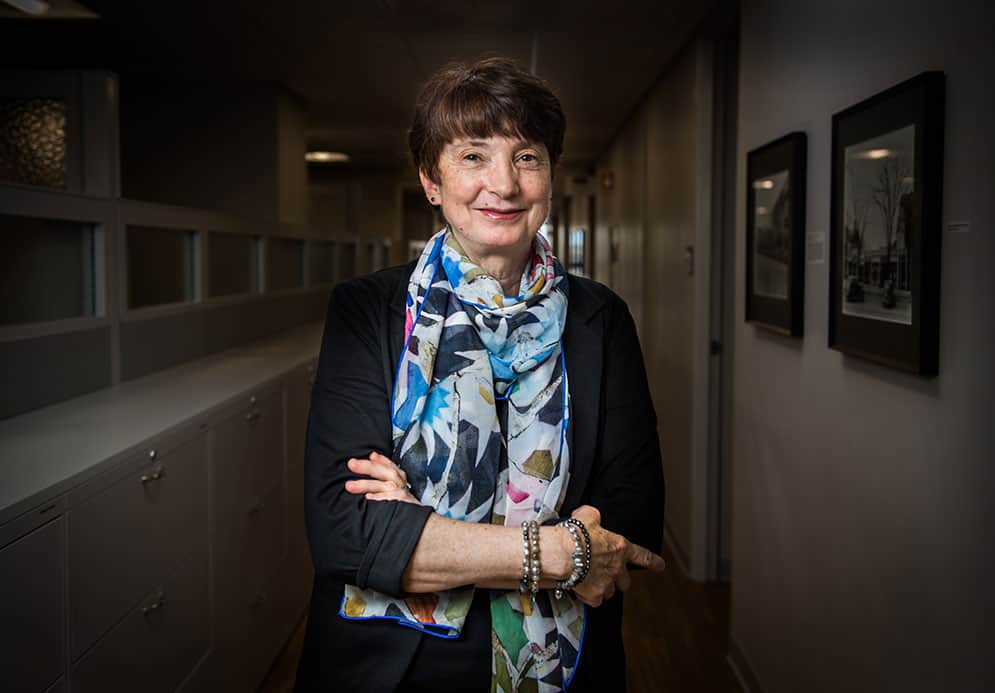
Komen Scholar Dr. Julie Palmer grew up never knowing her mother had been diagnosed with breast cancer. It was only after she graduated from college and her mother faced her second breast cancer diagnosis that she learned her mother quietly had a mastectomy when Palmer was in the sixth grade.
“In those days and at my age, she didn’t tell any of us,” Palmer remembers. Learning about her mother’s diagnosis spurred Palmer to pursue her doctorate and become a breast cancer researcher. She discovered very early in her career that researchers lacked a diverse pool of data to use when studying the disease.
“My first job was with one of the early groups doing women’s health research in the 1980s, when most of the research had come from studies predominantly in men,” Palmer said. “After I received my doctorate and was able to initiate my own research, I identified a huge gap in the field’s research. Although there was increasing amounts of research being done in women, almost all the research was done in white populations.”
Black women experience higher rates of death from breast cancer due to a combination of factors, including barriers to early diagnosis and high-quality treatment, the aggressive nature of certain breast cancers diagnosed more often in Black women, lack of high-quality care, genetics, discrimination, and systemic racism. Black women in the U.S. are about 40% more likely to die of breast cancer than white women.
Palmer committed her research to studying breast cancer in Black women, launching the Black Women’s Health Study (BWHS) in 1995 with 59,000 women between the ages of 21 and 69 who self-identified as Black. Over the first 25 years of the study, more than 3,000 of the women have developed breast cancer.
“Because half of the women who enrolled in the study were age 38 or younger, we were able to research early onset breast cancer,” Palmer said. “Our aim has been to identify a modifiable factor that may explain why some Black women get the disease and others don’t.”
While Palmer attributes her mother’s breast cancer diagnosis as the reason she became a breast cancer researcher, she points to her late sister’s metastatic breast cancer (MBC) diagnosis and passing as why she will dedicate the rest of her career to finding cures.
“My sister had an early-stage breast cancer. She followed my mother’s advice and had a bilateral mastectomy. Everyone thought she would do very well, but nine years later, her cancer metastasized to other organs. We knew then that was never going to be curable,” Palmer said.
“She lived for another eight years, long enough to see her daughter finish college. It’s been a huge loss for me and less than three years since she died. Everything I do now, I dedicate to her and her daughter. That has made me dedicated to better understanding MBC that can occur so long after the first breast cancer.”
In her sister’s memory, Palmer remains a committed advocate for encouraging people to participate in research. She hopes that Komen’s groundbreaking initiative, ShareForCures, can help reveal the next research breakthrough. ShareForCures invites people to safely share data about their breast cancer experience through Komen’s secure online platform, providing researchers with a more diverse pool of data to use in the search for cures.
“In order to have research that is going to come out with results that are meaningful, you really need large numbers of people in the study so that you can divide them into subgroups of people. The studies that are being done so far each have different limitations. ShareForCures is really trying to do away with those limitations,” Palmer said.
ShareForCures is the solution breast cancer researchers need now more than ever to help find discoveries that will help all people, Palmer added, noting that different types of breast cancers need innovative, groundbreaking solutions that are tailored for diverse population groups.
“A strength from my study is that we’re getting information from the women themselves. They know best about what their diet is, what medications they’re taking, and how much they exercise. But what we don’t have is a record of exactly what kind of chemotherapy they had, how many cycles, and other relevant information from their medical records. If patients can provide both types of information and make their records available through ShareForCures, we can fill the gap we’ve been missing in the research.”
When you join ShareForCures, you can help accelerate the search for breast cancer breakthroughs. With thousands of others, you can help make our vision of a world without breast cancer a reality. Learn more about ShareForCures today.
Komen has resources available in Spanish and other languages on our Translated Resources page.



